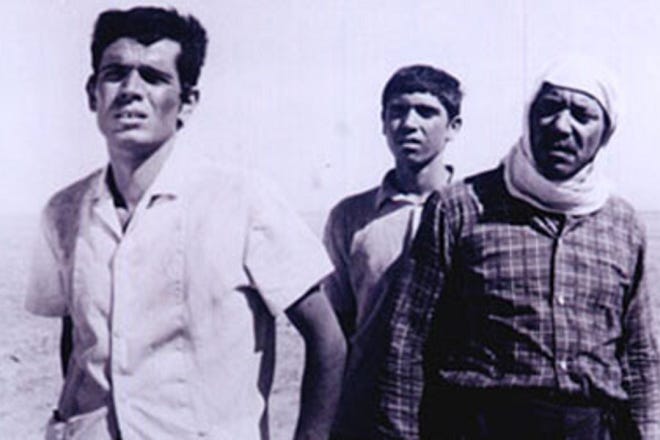Book Review: "Men in the Sun" by Ghassan Kanafani
A Palestinian novel from the past that screams about the present
“It was in another country that I earned my harsh subsistence, a place that had everything and nothing, that same country which gave you everything in order to deny you it.”
There are few Palestinian novelists, or writers of any nationality, who speak to the harsh existence of displacement as powerfully as Ghassan Kanafani. A writer who shaped the struggle of statelessness into sublime word, masterfully weaved together into a timeless novel, Men in the Sun.
Statelessness has become synonymous with Palestinian identity, and the words Kanafani etches above in All That I Left to You exposes its paradoxes and perils. Statelessness is a unifying thread in all of Kanafani’s work, which echoes the existential marrow of Palestinian identity.
Men in the Sun, more than his other writings, adds real flesh and raw emotion to that Palestinian tragedy of displacement. A ballad that began in 1948 with the Nakba and is unfolding, all over again, today with the unfolding genocide in Gaza.
Men in the Sun is timeless. But Kanafani’s story is not the subject matter of past time catastrophe, but a lurid and living accounting of a archetypical story that supersedes time and space, generations and figures. The novel, when read alongside the images of waves of Palestinians from Gaza pushed south and away from home right now, screams from the pages.
Kanafani, through his poignant prose, delves into the intricacies of displacement, despair, and the elusive pursuit of a better life. Kanafani's characters, Abu Qais, Assad, and Marwan, traverse the scorching desert mirroring the relentless journey of the Palestinian people. They are men of disparate ages, representing the cross-generational trauma of The Nakba and its endless chute of statelessness.
The narrative serves as a metaphor for the broader struggle against political and economic adversity. Abu Qais, the embodiment of resilience, represents the unwavering spirit of a people thrust into the unforgiving winds of displacement. Assad, the middle-aged man, borrowed money from his uncle to build a better life in The Gulf. While Marwan, wide-eyed and sixteen years old, packs his only belongings alongside the two elder men hoping to make a life atop fresh wounds of of depair.
The mirage of economic prosperity in Kuwait becomes a compelling symbol in Kanafani's hands, reflecting the universal human desire for a brighter future. For hope, somewhere in the physical or mental distance. The characters’ pursuit of this dream echoes the aspirations of countless individuals seeking refuge from economic hardship.
The novella's brilliance lies in Kanafani's ability to intertwine the personal with the political. The desert journey becomes a canvas upon which the author paints the complexities of Palestinian identity and the intergenerational impact of displacement. Assad, the young and hopeful, stands as a testament to the resilience of youth in the face of adversity, while Marwan's character bridges the past and present, emphasizing the enduring nature of the Palestinian struggle.
In Men in the Sun, Kanafani crafts a narrative imbued with symbolism and foreshadowing, weaving together the harsh realities of the desert with the broader Palestinian experience. The multiple perspectives employed by the author provide a nuanced understanding of the characters' motivations and fears, emphasizing the collective nature of their journey.
Kanafani's work, despite being written in the 1960s, remains a poignant reflection of the Palestinian condition. It resonates with the broader diasporic experience and serves as a timeless reminder of the human cost of political conflicts, and the residual trauma of displacement.
Men in the Sun is more than a novel; it is a visceral exploration of the Palestinian soul, masterfully articulated by Ghassan Kanafani, capturing the essence of a people yearning for home and identity amidst the relentless sands of time.
As the genocide unfolds on our timelines in Gaza, and the droves of Palestinians are pushed elsewhere, out, and in places still to be determined, Men in the Sun is more than timely reading; but essential education.
As James Baldwin reminds us, history is not the past, but always with and within us.
Khaled A. Beydoun is a law professor and author. He publishes his insights at @khaledbeydoun.







Wish I could write like this. Concise, and with beautiful words.
Khaled, thank you for dedicating so much time and soul to amplifying Palestinian voices and all the work you are doing. May I ask if you write poetry?
Fantastic review — you expertly captured the emotions one feels when they read this novella.
Kanafani's 'Men In The Sun and Other Palestinian Stories' was my first foray into Palestinian literature. In the Introduction there is an excerpt from a letter than Kanafani sent to his son that has remained with me since I read it:
'I heard you in the other room asking your mother: “Mama, am I a Palestinian?” When she answered: “Yes”, a heavy silence fell on the whole house. It was as if something hanging over our heads had fallen, its noise exploding, then – silence.
Afterwards . . . I heard you crying. I could not move. There was something bigger than my awareness being born in the other room through your bewildered sobbing. It was as if a blessed scalpel was cutting up your chest and putting there the heart that belongs to you . . . I was unable to move to see what was happening in the other room. I knew, however, that a distant homeland was being born again: hills, plains, olive groves, dead people, torn banners and folded ones, all cutting their way into a future of flesh and blood and being born in the heart of another child . . .
Do not believe that man grows. No; he is born suddenly – a word, in a moment, penetrates his heart to a new throb. One scene can hurl him down from the ceiling of childhood on to the ruggedness of the road.'